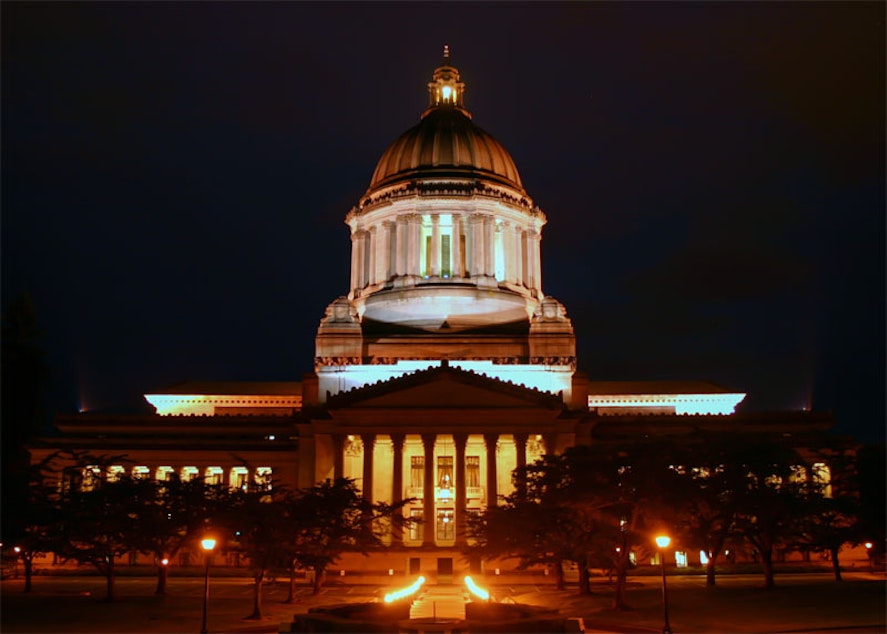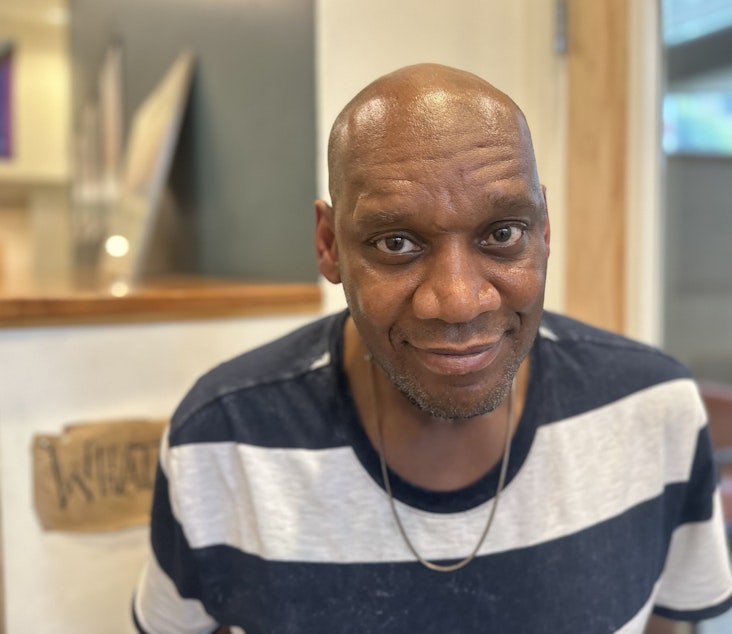Compromise leads to a big fix in Washington (is that allowed?): Today So Far

- Washington's lawmakers passed an updated drug possession law during a one-day special session.
- Should the Northwest start investing in more air conditioning?
- Snoqualmie Tribe starts a sales tax.
- What to watch at SIFF before it ends.
This post originally appeared in KUOW's Today So Far newsletter for May 17, 2023.
The fix is in. Washington's lawmakers passed an updated drug possession law during a one-day special session.
What passed is a bipartisan compromise (What?! Is that even allowed?! Have we always been able to do this?!). Using drugs in public, or possessing small amounts of drugs, is now a gross misdemeanor. The bill also opens up legal options for addiction treatment. There's a longer story behind why this law was needed, but the short version is that the state only had a temporary drug possession law in place, which was set to expire in July, so the pressure was on to make something happen.
It took lawmakers an entire session to flub the first proposed fix for this issue, and it took them a single day to approve this recent version. Personally, I credit my previous deriding remarks, mildly poking fun at lawmakers after failing to pass the first fix. I'm sure that's what did it. Perhaps moving forward, if lawmakers fail to make compromises during an official session, each one gets a pie in the face. It's Washington, so we can make it an apple pie, or a loganberry pie. If they do a decent job, then we'll just let them take the pie home. Sort of like a carrot and stick situation. That sounds reasonable and civil, right?
There is sure to be criticism from multiple corners around this new law. Future tweaks could come along. For now, let's offer lawmakers a virtual high five for working together and compromising to make things happen. Though, if I'm talking about pies at this point, then it's probably a good idea to just read the full story on this. Jeanie Lindsay has that report here.
On Monday, following a hot weekend and as students were returning to classrooms, new high temp records were set in the cities of Bellingham, Olympia, and Seattle.
Sponsored
In Federal Way, teachers responded by covering class windows with butcher paper, turning off lights, and bringing in their own fans, all in an effort to cool down. The 80-degree temps that our spring heatwave has produced might not seem like a big deal in other parts of the USA, but in Washington — where people prepare more for rain, clouds, and cold temperatures — they can be quite a problem. A lot of the buildings in the region were built to keep heat in, not cool down. That includes school buildings.
“We encourage our students to focus and try their best on this computer test, but it is upwards of 80, 90 degrees in a classroom, so it adds another factor," Federal Way teacher Shannon McCann told KUOW.
Kids in a hot classroom are about as effective as those kids in "Pete and Pete" waiting for Mr. Tastee amid a heatwave.
I know, because I remember spending third grade in a portable building at Challenger Elementary as the heat went up. It was like being in that sweltering room in "12 Angry Jurors," but with 8-year-old kids. I remember going on and on about how the guy was innocent before my teacher yelled that we were talking about math and told me to sit down.
Over the past few years, the "ways to cool down" article has become more popular around the Northwest. We've all seen plenty of online posts about connecting fans, tubing, and coolers filled with ice to create A/C contraptions when stores run out of actual units (or for folks who simply cannot afford an air conditioner). They've become as popular as write ups for "make your own air filter for wildfire smoke." As the region copes with climate change in the years ahead, it may be time for the Northwest to evolve. Our region should think as much about A/C as it does about rain and keeping warm.
Sponsored
There are already calls for more air conditioning units and updated HVAC systems in schools. KUOW's Sami West has the story here.
The Snoqualmie Tribe has instituted a tax, which is believed to be the first of its kind in the USA. When you visit the Salish Lodge and Spa, there will now be a 2% sales tax.
For many generations, the Snoqualmie had no land of their own. Recently, the tribe purchased 12,000 acres in east King County, where members had historically lived. The area around the Salish Lodge has been owned by the tribe since 2019. The new tax is slated to support such land, and the tribe's efforts to preserve it.
"We're talking about protections of cultural resources, and natural resources," Jaime Martin, a tribal member and executive director of governmental affairs, said in a statement.
KUOW's Diana Opong has the full story here.
Sponsored
The Seattle International Film Festival is underway, and there are a lot of screenings over the coming days. If you're venturing out for a SIFF movie over the next few days, KUOW's arts reporter Mike Davis has a few suggestions (and a general overview) for what to watch.
I'm going to point to one film that piqued my interest, for obvious reasons. As a former video store employee, "I Like Movies" stands out.
It's about a 17-year-old film nerd working at a movie store (sounds relatable), who spends their time with other clerks who refer to films not only by their title, but also by their directors (very familiar). But this teen also has to put up with store managers who could care less about movies, and only want to sell, sell, sell more DVDs, popcorn, and soda (now this is getting eerie), as well as the stress over customers who can't seem to turn movies in on time (OK, just stop). These are the kind of people who will reference a 1991 episode of "Pete & Pete" in conversation as if that's normal (seriously, if you got that pop culture reference above, I tip my hat to you). All this set against the drama of retail life. If this film references the embarrassing interaction with a customer after they accidently return their personal copy of an adult film inside the case of "Dude, Where's My Car?" then it might be hitting a little too close to home.
"I Like Movies" is slated to close out SIFF this year on May 21. Check out all of Mike's SIFF recommendations here.
AS SEEN ON KUOW
Sponsored

Darryl Lee lives in the First Hill neighborhood, at Plymouth Housing, which offers supportive housing for people who were chronically homeless. Lee was featured in a recent story by KUOW's David Hyde, looking into a new contingency management program in Seattle that provides incentives for people to stay sober. (David Hyde / KUOW)
DID YOU KNOW?
It is the season to barbecue, or barbeque, or BBQ. However you spell it, folks are cleaning up their grills these days, preparing to sizzle. The tradition of grilling and cooking meats is something that is shared among cultures across the planet. But our concept of barbecue has its roots in America.
The English-speaking world got the word "barbecue" from the Spanish word "barbacoa," but the word didn't originate in Spanish. The Spanish got it from the Timucua who were indigenous to the Caribbean and Florida area, as well as other people who spoke the Arawakan language throughout the region. The original word was probably more along the lines of "barbaca" or "barabicu." When the Spanish started moving through the region in the 1500s, they picked up the word after witnessing Indigenous groups cooking meat on wooden racks over a fire. The method gave the meat a flavor we associate with barbecue. The Spanish took the word wherever they went. The word "balbacua" in the Philippines is believed to to have been derived from the original Caribbean word, carried there by Spanish explorers (though in the Philippines, this is more of a stew than a grilled dish).
Sponsored
Over the past few hundred years, the concept has evolved across cultures, regions, and more. Today we have sauces, smoking, grilling, Kansas City style, Texas style, Memphis style, etc. There's also the classic wood fuel, charcoal, and Hank Hill's coveted propane.
ALSO ON OUR MINDS

The IRS is building its own online tax filing system. Tax-prep companies aren't happy
The IRS is developing a system that would let taxpayers send electronic returns directly to the government for free, sidestepping commercial options such as TurboTax. The agency plans a pilot test of the program next year.

